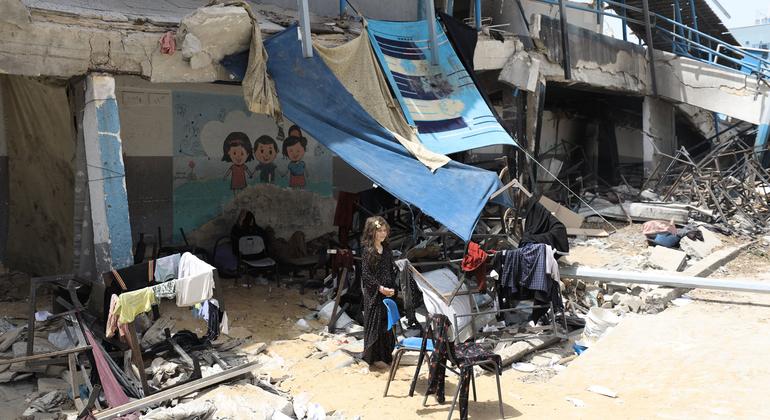“In Gaza, we are deeply committed to humanitarian aid to the population in Gaza, where UNRWA is the backbone of that support,” Mr. Guterres told journalists in Geneva. “We have faced a number of difficulties and obstacles that are well known, but nothing diminishes our commitment,” he added, amid a long-running misinformation campaign to discredit the UN agency.
Attacks hamper aid effort
Turning to the ongoing challenge of providing lifesaving humanitarian assistance, especially since early May when the Israeli military closed the vital Rafah border crossing, the UN chief noted it remains “extremely difficult to support the population that is under fire; it’s extremely difficult to support the population when there are so many restrictions to the entry of the necessary supplies for humanitarian aid”.
Asked to comment about the findings of a report published earlier in the day by a top Human Rights Council-appointed probe into the Gaza war that found Hamas and Israel guilty of war crimes, the UN chief underscored the enormous scale of destruction and death in the past eight months of hostilities.
“We have witnessed…a unique level of destruction and…unique level of casualties in the Palestinian population during these months of war that has no precedent in any other situation that I’ve lived as Secretary-General of the United Nations.”
Widening inequality
The Secretary-General was speaking on the sidelines of the Global Leaders Forum at UN Geneva, hosted by UN Trade and Development (UNCTAD), where he took the opportunity before heading to the G7 Summit in Italy beginning on Thursday to repeat his deep concerns about the unequal distribution of wealth in the global economy – and the need for richer nations to support those trying to embrace industrialization.
“Developing and emerging economies outside China have seen clean energy investments stuck at the same levels since 2015 and Africa was home to less than one per cent of last year’s renewables installations despite its wealth of resources and its vast potential,” Mr. Guterres said.
“We need advanced economies to rally behind the emerging and developing ones and to show climate solidarity by providing the technological and financial support they need to cut emissions.
Walk the talk
There must be “a clear commitment from the G7 on doubling finance for adaptation by next year and closing the adaptation finance gap.”
Echoing that message, Rebeca Grynspan, Secretary-General of the UN Trade and Development agency UNCTAD, welcomed the “resurgence of industrial policy” in some parts of the world that vindicated the State’s “vital role” in economic development and transformation.

UN Secretary-General António Guterres addresses journalists in Geneva following the opening of UNCTAD’s Global Leaders Forum.
But she cautioned that for many developing nations burdened by debt and limited fiscal space, “this resurgence is a distant horizon”, just as the UN Secretary-General told delegates that new trade barriers introduced annually “have nearly tripled since 2019, many driven by geopolitical rivalry with no concern for their impact on developing countries”.
Such a trend must be avoided if the world’s most vulnerable countries and individuals are to enjoy the benefits of the UN-backed Sustainable Development Goals (SDGs), Mr. Guterres insisted, as he declared that the world “cannot afford splits into rival blocs.”
Only meeting the targets will ensure peace and security where there is “one global market and one global economy in which there is no place for poverty and hunger.”
Developing world in the driving seat
Some progress has been made in tackling these enduring problems and in the 60 years since UNCTAD was created, “over a billion people have been lifted out of poverty” and the developing world “is now the engine of global trade and economic activity”, Ms. Grynspan noted.
But she added that far while for some, this may “give the illusion that the ground is less uneven today than it was six decades ago”, for “the poor, the unconnected, the discriminated, the rural, but also the women, and the youth – the ground remains uneven, the climb too steep”.



